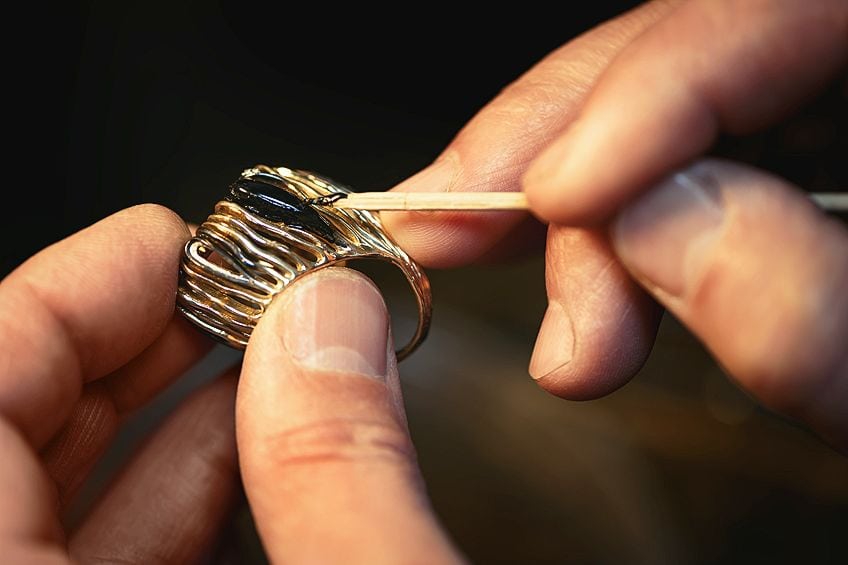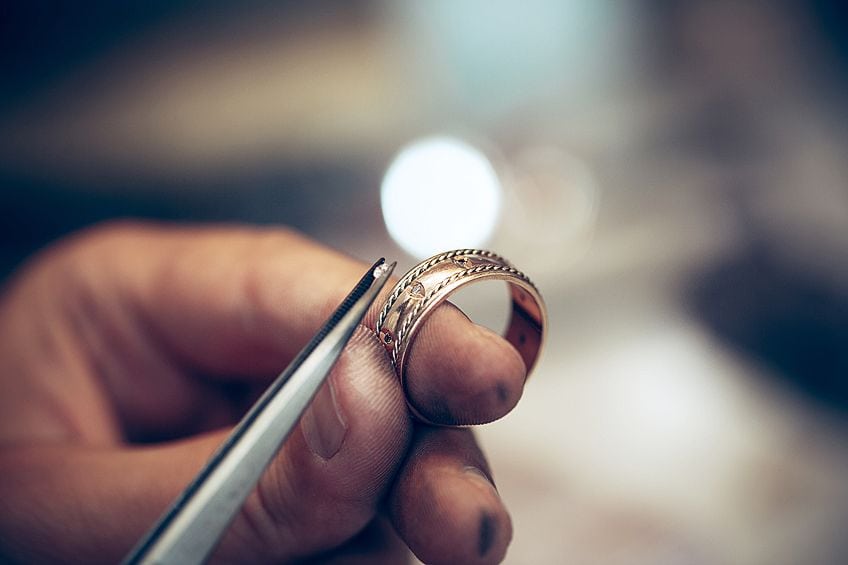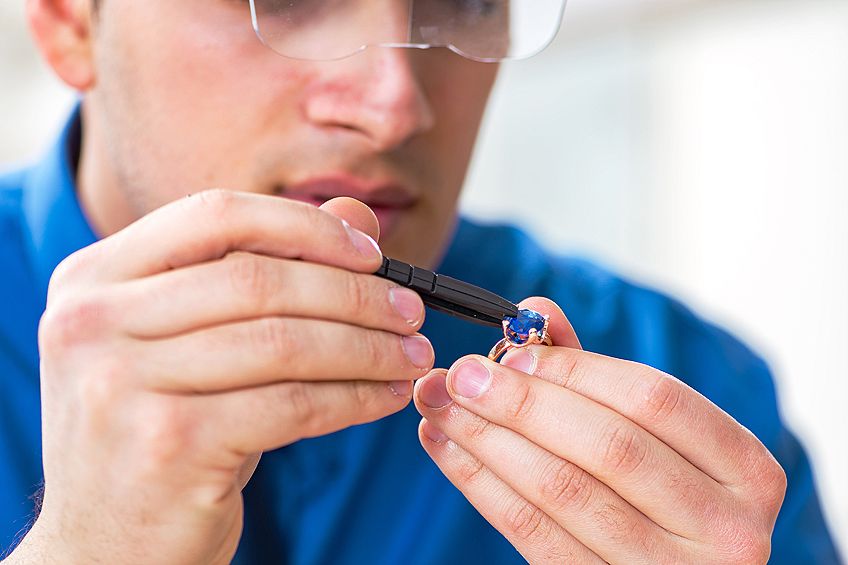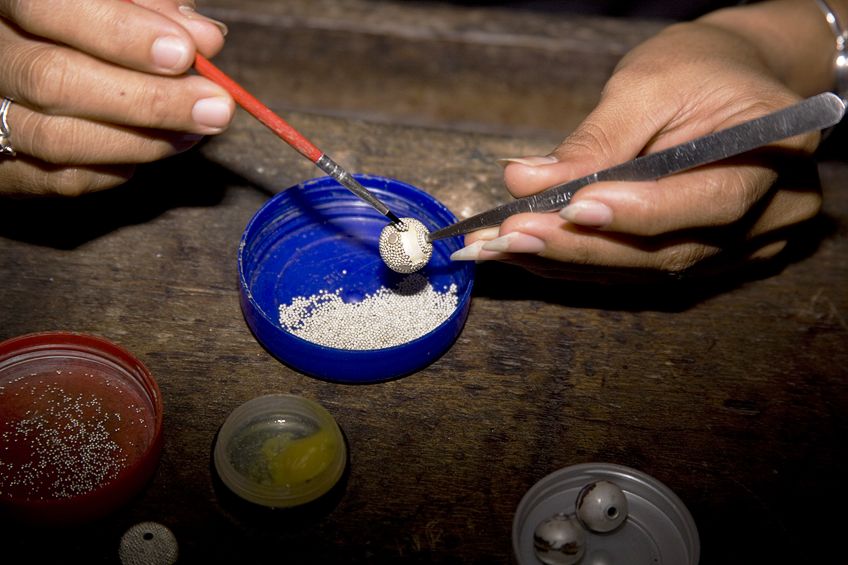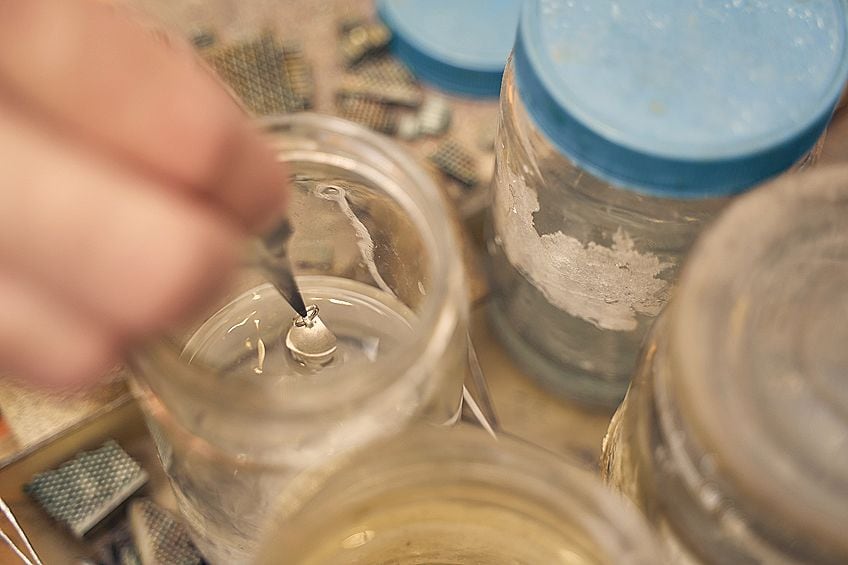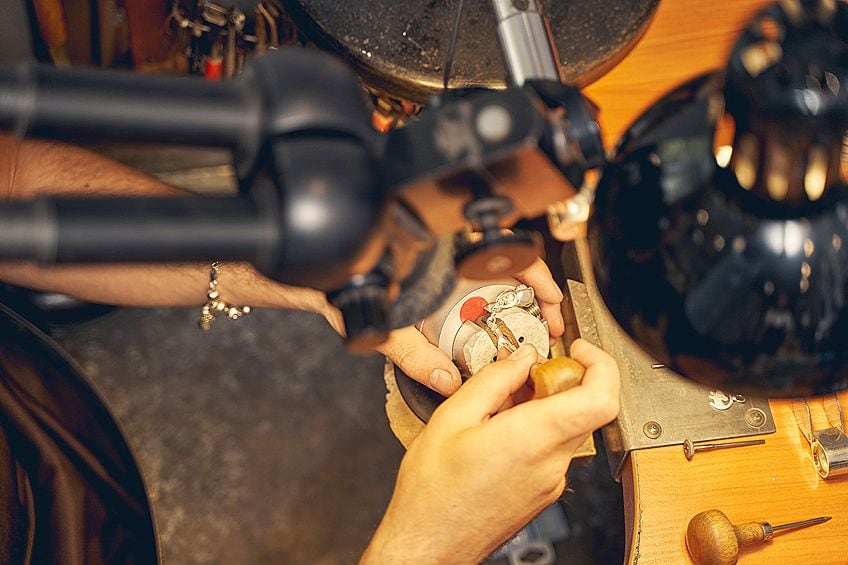Best Jewelry Glue – Selecting the Right Glue for Jewelry Making
This post may contain affiliate links. We may earn a small commission from purchases made through them, at no additional cost to you. You help to support resin-expert.com
Jewelry making can be done by professionals and hobbyists alike. Regardless of your skill, you will require specific tools to do the job, and glue for jewelry is one of the important pieces when it comes to the jewelry-making process. However, you could also simply want to fix a piece of jewelry – perhaps a gemstone has broken loose? Jewelry features prominently in our lives from wearing earrings, bracelets, necklaces, and rings. No matter if it is simply for repairs or creating a unique jewelry piece, getting the right jewelry adhesive is important. So, let us now go into a little more detail about the best jewelry glue.
Table of Contents
Types of Jewelry Adhesives
There are all kinds of jewelry, and with some metal pieces, you will need a soldering iron or a proper glue for metal jewelry. Jewelry can also be made from plastic, wood, gems, ceramics, stones, clay, and other materials. So, having the correct jewelry adhesive is important if you want to create a strong bond that lasts.
As mentioned, glue is not only used in creating the jewelry but also in repairs, and can include glue for metal jewelry, general jewelry glue, epoxy resin glues, and craft glue.
Jewelry Glue or Cement
Jeweler’s glue, or cement, is an extremely strong jewelry adhesive and is used for finer details and smaller beads and embellishments. The glue is usually applied with a fine applicator for precision work. The bead glue dries fast and clear and can get into all those difficult-to-reach areas. The glue can also be used on things like appliqués and fixing cord ends.
All-Purpose Jewelry Adhesive
This is a general and all-purpose glue that will work on jewelry, wood, fabric, leather, glass, ceramics, metal, and more. This makes it wonderfully versatile and perfect to have on hand for jobs around the house. The glue is temperature-resistant, waterproof, and remains flexible, so it can be used in all kinds of projects.
Epoxy Resin
Epoxy resin is also considered a heavy-duty option when it comes to using it on jewelry. It is great for glue for gemstones as well as for beads and securing them to metal. The resin cures clear and is, therefore, perfect for jewelry-making purposes. You can also use epoxy resin to create entire jewelry pieces or to cast smaller parts.
Superglue
This type of glue is also versatile and can be used on multiple surfaces. The glue dries fast and sets clear, so it is perfect to use for bonding beads to vertical surfaces. The glue does tend to be slightly runny, and the drying time may make it difficult to work with as you need to finish what you are doing quickly. Superglue is best for projects that do not require a strong bond and for minor jewelry repairs.
A Guide to Buying Glue for Jewelry
Since there are quite a few choices when it comes to jeweler’s glue, it is best to read the instructions on the product labels before purchasing. All types of glue have varying formulas that offer different properties according to bonding strength, performance, and purposes. So, there are some things to take note of when purchasing the correct jewelry adhesive for your needs.
Selecting the Right Type of Glue for Jewelry
We have already discussed the various types of glue you can use to make jewelry. Always read the label and make sure that the glue you choose is able to bond to the surface you are working with. Not every glue will work properly on all surfaces, especially metal surfaces. You can purchase specific glue for metal jewelry; however, epoxy glue and superglue can also work. Although, superglue might not be the best choice when there are other options available.
Each glue product has its own strengths as well as weaknesses.
Setting Time
Superglue dries almost instantly, while other types of glue can take a few hours or longer to set or cure properly. Superglue works wonders if you want something done quickly. However, if you wish to create a stronger and more durable bond, you will have to wait a little longer. Also, working times are something else to take note of – if a glue dries fast, you have less time to work with it. Other slower-curing glues will give you enough time to get things just right.
Glue Color
When creating jewelry, you will generally be looking for a glue that dries clear. Also, if the glue is transparent, it will not affect any other part of the jewelry piece. You can make mistakes without having to worry too much as they will not be visible. Epoxy glues might cure and contain a slight yellow tint, which could make certain flaws more obvious. Some glues are paintable, so this might not be an issue in certain cases.
Durability
Jewelry can be exposed to many things, so it should be durable and able to resist high temperatures. Some glues will begin to melt in hot weather, and will therefore not be effective as a jewelry adhesive. People swim or bathe with their jewelry on, so having water-resistant properties is also something to consider. It would also be good if the glue is not affected by oils or creams, either, such as hand lotions.
Glue Flexibility
You do not want a glue that dries hard and can become brittle. Many jewelry pieces have to deal with pressures, movement, and impacts, so flexibility is important to maintain its strength without breaking into pieces.
Ease of Application
Working with jewelry can be difficult when using small pieces, and applying glue can be frustrating if it goes all over the place. Some glues come with fine nozzles that offer more precision when using on small beads and other detailed areas. The glue should also have a good consistency – not too runny and also not overly thick for the perfect bond.
Best Glue for Jewelry Making
Now that we know that glue is a general term and that not all glues are made the same, we have gathered a few options for the best jewelry glue. Whether you are doing a simple repair job or wanting to finish a beautiful design piece, having the right glue is essential.
Best All-Purpose Jewelers Glue: E6000 Jewelry and Bead Adhesive
The E6000 Jewelry Adhesive is a strong all-purpose glue that works on a variety of surfaces including ceramics, leather, metal, glass, wood, fabric, and lots more. The glue remains flexible when dry and can hold up against changing temperatures and harsh conditions. The gel-like adhesive gives you enough time to glue your items and is best left to cure for 24 hours. The product comes with precision applicators for dealing with more detailed work.
- A strong all-purpose glue that works on a variety of surfaces
- Glue is highly durable and flexible once dry
- Comes with a precision applicator for more detailed work
PROS
- All-purpose
- Comes with precision applicators
- Dries clear
- Durable
- Flexible, permanent bond
CONS
- May be messy to work with
- Can have an unpleasant smell
Best Super Glue for Jewelry: GORILLA Super Glue Gel
Gorilla Super Glue is a great choice for household uses, although it can also make a good glue for jewelry. The glue offers a durable bond that sets extremely quickly. The glue will dry in a few seconds to a clear bond that can withstand quite a bit wear and tear. The formula is non-drip, so can be applied to vertical surfaces easily. The glue can be used on all types of surfaces including rubber, leather, metal, stone, and more.
- No-run control gel formula that is great for use on vertical surfaces
- Versatile glue with an anti-clog cap to prevent it from drying out
- Specially formulated for increased impact resistance and strength
PROS
- Can be applied to most materials
- Dries fast
- Easy to use
- Non-drip formula
CONS
- Might dry too fast for more detailed jewelry making
- May give off fumes
- Not completely waterproof
Best Resin Jewelry Adhesive: DECORROM UV Resin
The DecorRom UV Resin Glue is ready to use, with no need to mix or prepare beforehand. The resin will cure thoroughly in minutes under UV light. The resin dries clear, is scratch-resistant, and will not yellow over time. The resin can be used for different projects including jewelry making, crafting, and more. The resin is also toxic-free and safe for the environment.
- UV resin requires no preparation and is ready to use right away
- Ultraviolet resin cures to a crystal-clear, glassy finish
- Provides excellent scratch, stain, and yellowing resistance
PROS
- Ready to use
- Short curing time
- Water-resistant
- Scratch- and yellow-resistant
- Value for money
CONS
- Has a bad smell
Product Comparison Table
Just like superglue, you might want things to move along quickly, so here is a comparison table that gives you the types of jewelry adhesives and what you can use them for. Again, always read the product instructions to see if the glue you choose is what you are looking for. Reading the product reviews can also help with making the right decision.
| Jewelry Adhesive | What Can It Be Used With? | Drying Time |
| E6000 (All-purpose glue) | Ceramics, leather, metal, glass, wood, fabric, stone | Dries clear, 4-minute working time, sets in 20 minutes, and fully cures in 24 hours |
| Gorilla Glue (Super Glue) | Rubber, leather, metal, stone, glass, and certain plastics. | Translucent, sets in 10 to 45 seconds, wait 24 hours before for best results |
| DecorRom UV Resin | Most surfaces including glass, plastic, stone, wood, metal, rhinestones, cabochons, and ceramics | Clear, cures in 1 to 2 minutes with a UV light and 10 to 15 minutes if outside in the sun |
How to Use Bead Glue
Maybe you are thinking, how difficult can using glue be? Although it might be a simple process, there are a few things you should learn to make things easier and less messy. First, you need to get the right glue for gemstones, metal, or bead jewelry.
As discussed above, many of the glue products are versatile and can manage more than one surface. However, you need more precision for those smaller beads. Using the incorrect glue will simply cause mess and frustration. Professional jewelry making can become an intricate and challenging experience, so we are keeping it simple. Below, we will be discussing a simple ring setting tutorial for beginners.
Before you Begin…
To achieve better results, you might want to consider roughening the surface of your metal setting, which should create a stronger bond. You can use some sandpaper or even a small needle or pin to roughen the surface. Before you begin, make sure that everything is clean and completely dry before applying any glue.
In many cases, superglue might not be the answer – maybe for a quick repair, but it is not the first choice when making jewelry. There are better jeweler’s glue options available that will provide a stronger and longer-lasting bond.
How to Make a Ring
Almost anybody can do this, as it is the perfect beginner’s project if you are interested in making your own jewelry. So, the first thing to do is to gather the tools and items you will be using. Here is a list of what you will need:
- Ring setting = these can easily be purchased at bead or craft stores
- Gemstone cabochon or bead with a flat surface
- Epoxy glue, ready to use or two-part syringe epoxy
- Small piece of cardboard
- Toothpick
Place some of the glue onto the piece of cardboard. If it is a two-part syringe epoxy, simply squeeze it onto the cardboard and mix it with the toothpick. Take the toothpick with the glue on the end and apply it to the ring setting. You can then place the ring into some putty or Blu Tack, which will hold the ring upright while you attach the gemstone or bead. Place the gemstone into the setting and let it stand for ten minutes.
Depending on what glue you use, the setting or curing times may differ, so always read the product instructions for this information.
Removing Glue From Jewelry
Sometimes, things do not always go smoothly when repairing or making jewelry. You might accidentally mess on your work surface or stick your finger together. Do not panic, as there are ways to remove the glue without problems.
Rubbing Alcohol
This is an effective method for removing glue, however, the materials you are using should be compatible, so it is best to check this out before using. Softer materials or stones such as pearls or opals might be damaged. Other materials like silver, stainless steel when glued, or gold should not be affected. Use a small amount of rubbing alcohol and place it onto a part of your jewelry to see what happens. If the jewelry materials you are using do not have any problems, you can soak them in some rubbing alcohol for an hour or two. Remove and then wipe clean with a cloth.
Acetone
Acetone can be used to remove glue from your jewelry as well as if you get any on your skin. Nail polish remover can also be used, as this contains a certain amount of acetone that should work effectively. Again, use a small amount to test on your piece of jewelry before soaking or rubbing it with acetone.
Polishing Cloth
A polishing cloth is great for removing dirt, scratches, and fingerprints and will create a shine to the jewelry surface, particularly if it is a metal surface like silver, gold, or steel. You can also use it to buff gemstones to make them shine. Of course, you can also try to use the cloth to remove any glue residue.
Scraping the Glue Off
This is a simple method for removing glue, although the easiest way would be to wipe the glue off when it is still wet. When the glue has dried, you can scrape it off with a toothpick, a brush, or some other sharp tool. However, you must be gentle enough not to damage the surface. Some stones or other materials can be soft, so make sure that you work gently or use another method.
Tips for Using a Jewelry Adhesive
Making jewelry can be a satisfying and rewarding experience. Professional jewelry makers already have the knowledge and skill to create beautiful pieces. However, as a beginner or hobbyist, you are still learning all the ins and outs of this skill. Here are a few tips to help you out when using the best glue for jewelry making.
- When using glue on a jewelry project that will be experiencing wear and tear, make sure that the glue you choose is flexible enough to withstand the stresses.
- If you shower or bathe with your jewelry on, make sure that the glue you use is water-resistant or waterproof.
- Not all jewelry adhesives will dry clear – some will be transparent, so always read the product description when purchasing.
Always work in a well-ventilated space and consider wearing gloves when working with any type of adhesive.
- Always replace the cap after you have used the adhesive to prevent it from drying out.
- Wipe down your work surface with rubbing alcohol before you begin to remove any dirt or residue.
- If you are working with leather, a special leather glue would be a better choice than an all-purpose glue.
Frequently Asked Questions
Is Jeweler’s Glue Expensive?
When starting a new hobby like jewelry making, it can be quite expensive to start with. However, a jewelry adhesive is an affordable part of what you need. Various glue products are also readily available at local stores and online, so you can easily choose what product you wish to purchase.
What Is the Best Bead Glue?
When it comes to smaller items and precision work, glue cement (G-S Hypo) is best for using with plastic, ceramics, glass, and beads. The fine applicator will help you get to all those hard-to-reach small areas, especially where small beads are used.
Is Epoxy Resin More Durable Than E6000?
The two types of glue are different from each other, and you will need to choose one that is more suitable for your project. The E6000 is a silicone type of glue that provides flexibility, while epoxy is usually a two-part adhesive that also provides a strong bond but with less flexibility. Epoxy can also be used as an effective bond between metal surfaces.
Is Superglue the Best Choice for Jewelry Making?
Superglue can be used on jewelry but is best for quick repairs. Other jewelry adhesive options can offer better results, especially if using on metals and other surfaces. Superglue does provide a strong bond, however, many of the glues do not dry clear and provide an uneven finish. The fast drying time and runny consistency also make it difficult to use when you are making jewelry items.


